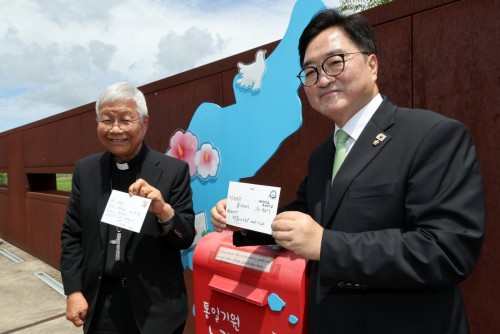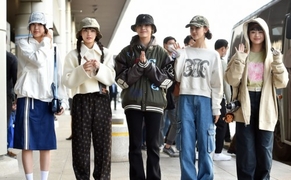 |
| National Assembly Speaker Woo Won-shik (right) and Cardinal You Heung-sik hold postcards with messages of peace at the Slow Mailbox in Imjingak Peace Nuri Park, Paju, Gyeonggi Province, on July 23. / National Assembly Press Corps |
As National Assembly Speaker Woo Won-shik passes the halfway mark of his two-year term, he has set his sights on two key tasks before leaving office: reforming the National Assembly Act and advancing constitutional amendment efforts.
According to Cho Oh-seop, chief secretary to the speaker, Woo is determined to address long-standing legislative gridlocks and modernize parliamentary operations before the end of his tenure.
In Korea’s deeply divided 22nd National Assembly, the speaker plays a crucial role as the head of the legislative branch among the three powers of state. Woo’s job requires steering bipartisan dialogue and offering procedural stability amid ongoing partisan strife.
The speaker sees it as a core mission to resolve issues rooted in repeated delays and inefficiencies—especially regarding the formation of standing committees and legislative bottlenecks.
Currently, committee chair positions are determined through backroom negotiations among political blocs, despite legal provisions mandating a vote in the full Assembly. Key committees such as Legislation and Judiciary, Budget and Accounts, and House Steering often stir the fiercest disputes. Though it’s customary for opposition parties to chair the Judiciary Committee, the ruling Democratic Party held it during the 21st Assembly, fueling controversy.
Cho said the speaker wants to amend the Assembly Act to reduce this annual friction, suggesting that changes could apply from the next Assembly onward to ease political resistance. “Because of these energy-wasting battles, the Assembly faces mounting criticism for failing to get things done,” he noted.
Speaker Woo has long advocated for constitutional reform, reiterating this priority in his National Constitution Day address. He called for “a phased and continuous amendment process, starting with feasible steps such as enshrining the spirit of May 18 in the preamble and introducing controls on emergency powers.”
Plans are underway to establish a special constitutional reform committee later this year. Earlier, Woo had even proposed holding a national referendum on constitutional reform alongside the 2021 presidential election.
While the speaker’s call for gradual amendments aligns broadly with the administration’s goals, subtle differences remain.
Cho Seung-rae, spokesperson for the National Policy Planning Committee, said there was no disagreement on the need to revise the presidency to allow re-election or extend terms. However, he noted, “We are not currently discussing the kind of phased amendment process Speaker Woo proposed. The president already presented a concrete reform blueprint during the campaign.”
Still, Cho added that whether to pursue piecemeal or comprehensive constitutional changes would ultimately be decided by the Assembly.
Another task on Woo’s radar is relocating the National Assembly to Sejong City—a promise made by President Lee Jae-myung. Completing this move, alongside the presidential office, would also require constitutional amendments.
By tradition, National Assembly speakers do not run for re-election in the following general election, as the role is typically reserved for senior lawmakers serving five or six terms. Whether Woo will return to frontline politics remains uncertain, but observers say he is intent on leaving behind tangible “graduation accomplishments.”
Meanwhile, Cho Oh-seop, who has served as speaker’s chief secretary throughout Woo’s term—a rare instance of continuity in the role—remarked: “When the speaker’s office isn’t busy, it means the Assembly is running smoothly. But these days, there’s no shortage of work.”
Most Read
-
1
-
2
-
3
-
4
-
5
-
6
-
7





















